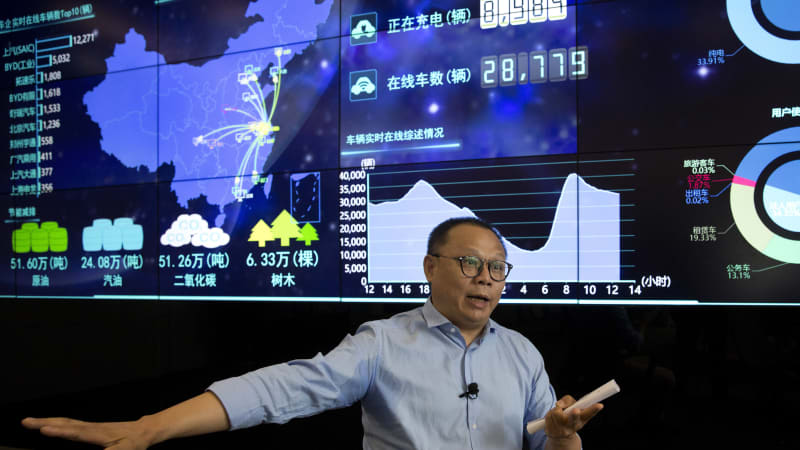Audi Repair Shop Doylestown
Call 267 279 9477 to schedule a appointment

SHANGHAI — Global automakers are feeding real-time location information and dozens of other data points from electric vehicles to Chinese government monitoring centers, potentially adding to China’s rich kit of surveillance tools as President Xi Jinping steps up the use of technology to track Chinese citizens. Generally, it happens without car owners’ knowledge, The Associated Press found.
More than 200 automakers selling electric vehicles in China — including Tesla, Volkswagen, BMW, Daimler, Ford, General Motors, Nissan, Mitsubishi and U.S.-listed start-up NIO — send at least 61 data points to government-backed monitoring platforms, under rules published in 2016.
Automakers say they are merely complying with local laws, which apply only to alternative energy vehicles. Chinese officials say the data is used for analytics to improve public safety, facilitate industrial development and infrastructure planning, and to prevent fraud in subsidy programs.
But critics say the information collected exceeds those goals and could be used to undermine foreign carmakers’ competitive position, or for surveillance. Under Xi’s leadership, China has unleashed a war on dissent, marshaling big data and artificial intelligence to create a more perfect kind of policing that can quickly neutralize perceived threats to the stability of the ruling Communist Party.
There is also concern about the precedent these rules set for sharing data from next-generation connected cars, which may soon transmit even more personal information.
“You’re learning a lot about people’s day-to-day activities and that becomes part of what I call ubiquitous surveillance,” said Michael Chertoff, who was secretary of the Department of Homeland Security under President George W. Bush and wrote a book called “Exploding Data.” “Companies have to ask themselves, ‘Is this really something we want to do in terms of our corporate values, even if it means otherwise forgoing that market?'”
At the Shanghai Electric Vehicle Public Data Collecting, Monitoring and Research Center, a wall-sized screen glows with dots. Each represents one of more than 222,000 vehicles connected to the system, coursing along Shanghai’s roads to create a massive real-time map that could reveal where people live, shop, work, and worship.
Data also flows to a national monitoring center run by the Beijing Institute of Technology, which pulls information from more than 1.1 million new energy vehicles. Those numbers are about to get much bigger, as Beijing pushes electric vehicle development as part of its “Made in China 2025” industrial development plan.
Ding Xiaohua, the deputy director of the Shanghai center, said monitoring is not designed to facilitate state surveillance, though data can be shared with police, prosecutors or courts, if a formal request is made. The center is registered as a non-profit but is tightly aligned with and funded by the government.
There is a privacy firewall built into the system. The data center has each car’s unique vehicle identification number, but to link that with the owner’s personal details, it must go through the automaker — a step it has taken in the past. Chinese law enforcement can also link the vehicle identification number with the owner’s personal information.
“To speak bluntly, the government doesn’t need to surveil through a platform like ours,” Ding said.
Many vehicles in the U.S., Europe and Japan transmit position information back to automakers, who feed it to car-tracking apps, maps that pinpoint nearby amenities and emergency services providers. But the data stops there. Government or law enforcement agencies would generally only be able to access vehicle data in the context of a specific criminal investigation and in the U.S. would typically need a court order, lawyers said.
Automakers initially resisted sharing information with the Shanghai monitoring center; then the government made transmitting data a prerequisite for getting incentives.
“They gave you dozens of reasons why they can’t give you the data,” said a government consultant who helped evaluate the policy and spoke on condition of anonymity to discuss sensitive issues. “Then we offer the incentives. Then they want to give us the data because it’s part of their profit.”
There was concern the shared data might reveal proprietary information about, for example, how hybrids switch between gas and battery power, and eventually set automakers up for commercial competition with a Chinese government entity.
Ding said confidentiality agreements protect proprietary company information. Still, he is open about his desire to make money from the data. “We have done some explorations,” he said. “But there is still a distance from truly monetizing it.”
China’s ability to grab data as it flows from cars gives it an edge. China tends to view technology development as a key competitive resource. Though global automakers have received billions in incentives and subsidies from U.S., European and Japanese governments, they are contributing data to China that ultimately serves Beijing’s strategic interests.
Automakers stressed they share data to comply with Chinese law and obtain consent from car owners. Nearly all have announced plans to aggressively expand electric vehicle offerings in China, the world’s biggest car market.
Volkswagen Group China chief executive Jochem Heizmann said he could not guarantee the data would not be used for government surveillance, but stressed that Volkswagen keeps personal data, like the driver’s identity, secure within its own systems.
“It includes the location of the car, yes, but not who is sitting in it,” he said, adding that cars won’t reveal more information than smart phones already do. “There is not a principle difference between sitting in a car and being in a shopping mall and having a smart phone with you.”
But not all electric vehicle owners feel the same.
Standing beside his white Tesla Model X, Shan Junhua said he might not have bought the car if he’d known its journeys were being recorded.
“Tesla could have it, but why do they transmit it to the government?” Shan said. “Because this is about privacy.”
Related Video:
from Autoblog https://ift.tt/2rdanEB
